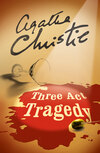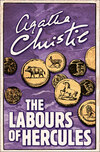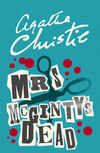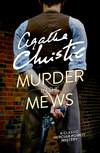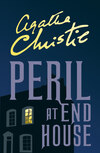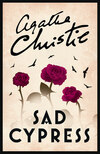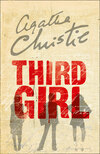Kitabı oku: «Three Act Tragedy», sayfa 3
CHAPTER 5
Flight From a Lady
Mr Satterthwaite thought to himself: ‘He’s got it badly.’
He felt a sudden pity for his host. At the age of fifty-two, Charles Cartwright, the gay debonair breaker of hearts, had fallen in love. And, as he himself realized, his case was doomed to disappointment. Youth turns to youth.
‘Girls don’t wear their hearts on their sleeves,’ thought Mr Satterthwaite. ‘Egg makes a great parade of her feeling for Sir Charles. She wouldn’t if it really meant anything. Young Manders is the one.’
Mr Satterthwaite was usually fairly shrewd in his assumptions.
Still, there was probably one factor that he did not take into account, because he was unaware of it himself. That was the enhanced value placed by age on youth. To Mr Satterthwaite, an elderly man, the fact that Egg might prefer a middle-aged man to a young one was frankly incredible. Youth was to him so much the most magical of all gifts.
He felt strengthened in his beliefs when Egg rang up after dinner and demanded permission to bring Oliver along and ‘have a consultation’.
Certainly a handsome lad, with his dark, heavy-lidded eyes and easy grace of movement. He had, it seemed, permitted himself to be brought—a tribute to Egg’s energy; but his general attitude was lazily sceptical.
‘Can’t you talk her out of it, sir?’ he said to Sir Charles. ‘It’s this appallingly healthy bucolic life she leads that makes her so energetic. You know, Egg, you really are detestably hearty. And your tastes are childish—crime—sensation—and all that bunk.’
‘You’re a sceptic, Manders?’
‘Well, sir, really. That dear old bleating fellow. It’s fantastic to think of anything else but natural causes.’
‘I expect you’re right,’ said Sir Charles.
Mr Satterthwaite glanced at him. What part was Charles Cartwright playing tonight. Not the ex-Naval man—not the international detective. No, some new and unfamiliar role.
It came as a shock to Mr Satterthwaite when he realized what that role was. Sir Charles was playing second fiddle. Second fiddle to Oliver Manders.
He sat back with his head in shadow watching those two, Egg and Oliver, as they disputed—Egg hotly, Oliver languidly.
Sir Charles looked older than usual—old and tired.
More than once Egg appealed to him—hotly and confidently—but his response was lacking.
It was eleven o’clock when they left. Sir Charles went out on the terrace with them and offered the loan of an electric torch to help them down the stony path.
But there was no need of a torch. It was a beautiful moonlit night. They set off together, their voices growing fainter as they descended.
Moonlight or no moonlight, Mr Sattherthwaite was not going to risk a chill. He returned to the Ship-room. Sir Charles stayed out on the terrace a little while longer.
When he came in he latched the window behind him, and striding to a side table poured himself out a whisky and soda.
‘Satterthwaite,’ he said, ‘I’m leaving here tomorrow for good.’
‘What?’ cried Mr Satterthwaite, astonished.
A kind of melancholy pleasure at the effect he had produced showed for a minute on Charles Cartwright’s face.
‘It’s the Only Thing To Do,’ he said, obviously speaking in capital letters. ‘I shall sell this place. What it has meant to me no one will ever know.’ His voice dropped, lingeringly … effectively.
After an evening of second fiddle, Sir Charles’s egoism was taking its revenge. This was the great Renunciation Scene, so often played by him in sundry and divers dramas. Giving Up the Other Man’s Wife, Renouncing the Girl he Loved.
There was a brave flippancy in his voice as he went on.
‘Cut your losses—it’s the only way … Youth to youth … They’re made for each other, those two … I shall clear out …’
‘Where to?’ asked Mr Satterthwaite.
The actor made a careless gesture.
‘Anywhere. What does it matter?’ He added with a slight change of voice, ‘Probably Monte Carlo.’ And then, retrieving what his sensitive taste could not but feel to be a slight anticlimax, ‘In the heart of the desert or the heart of the crowd—what does it matter? The inmost core of man is solitary—alone. I have always been—a lonely soul …’
It was clearly an exit line.
He nodded to Mr Satterthwaite and left the room.
Mr Satterthwaite got up and prepared to follow his host to bed.
‘But it won’t be the heart of a desert,’ he thought to himself with a slight chuckle.
On the following morning Sir Charles begged Mr Satterthwaite to forgive him if he went up to town that day.
‘Don’t cut your visit short, my dear fellow. You were staying till tomorrow, and I know you’re going on to the Harbertons at Tavistock. The car will take you there. What I feel is that, having come to my decision, I mustn’t look back. No, I mustn’t look back.’
Sir Charles squared his shoulders with manly resolution, wrung Mr Satterthwaite’s hand with fervour and delivered him over to the capable Miss Milray.
Miss Milray seemed prepared to deal with the situation as she had dealt with any other. She expressed no surprise or emotion at Sir Charles’s overnight decision. Nor could Mr Satterthwaite draw her out on the point. Neither sudden deaths nor sudden changes of plan could excite Miss Milray. She accepted whatever happened as a fact and proceeded to cope with it in an efficient way. She telephoned to the house agents, despatched wires abroad, and wrote busily on her typewriter. Mr Satterthwaite escaped from the depressing spectacle of so much efficiency by strolling down to the quay. He was walking aimlessly along when he was seized by the arm from behind, and turned to confront a white-faced girl.
‘What’s all this?’ demanded Egg fiercely.
‘All what?’ parried Mr Satterthwaite.
‘It’s all over the place that Sir Charles is going away—that he’s going to sell Crow’s Nest.’
‘Quite true.’
‘He is going away?’
‘He’s gone.’
‘Oh!’ Egg relinquished his arm. She looked suddenly like a very small child who has been cruelly hurt.
Mr Satterthwaite did not know what to say.
‘Where has he gone?’
‘Abroad. To the South of France.’
‘Oh!’
Still he did not know what to say. For clearly there was more than hero worship here …
Pitying her, he was turning over various consolatory words in his mind when she spoke again—and startled him.
‘Which of those damned bitches is it?’ asked Egg fiercely.
Mr Satterthwaite stared at her, his mouth fallen open in surprise. Egg took him by the arm again and shook him violently.
‘You must know,’ she cried. ‘Which of them? The grey-haired one or the other?’
‘My dear, I don’t know what you’re talking about.’
‘You do. You must. Of course it’s some woman. He liked me—I know he liked me. One of those women the other night must have seen it, too, and determined to get him away from me. I hate women. Lousy cats. Did you see her clothes—that one with the green hair? They made me gnash my teeth with envy. A woman who has clothes like that has a pull—you can’t deny it. She’s quite old and ugly as sin, really, but what does it matter. She makes everyone else look like a dowdy curate’s wife. Is it her? Or is it the other one with the grey hair? She’s amusing—you can see that. She’s got masses of S.A. And he called her Angie. It can’t be the one like a wilted cabbage. Is it the smart one or is it Angie?’
‘My dear, you’ve got the most extraordinary ideas into your head. He—er—Charles Cartwright isn’t the least interested in either of those women.’
‘I don’t believe you. They’re interested in him, anyway …’
‘No, no, no, you’re making a mistake. This is all imagination.’
‘Bitches,’ said Egg. ‘That’s what they are!’
‘You mustn’t use that word, my dear.’
‘I can think of a lot worse things to say than that.’
‘Possibly, possibly, but pray don’t do so. I can assure you that you are labouring under a misapprehension.’
‘Then why has he gone away—like this?’
Mr Satterthwaite cleared his throat.
‘I fancy he—er—thought it best.’
Egg stared at him piercingly.
‘Do you mean—because of me?’
‘Well—something of the kind, perhaps.’
‘And so he’s legged it. I suppose I did show my hand a bit plainly … Men do hate being chased, don’t they? Mums is right, after all … You’ve no idea how sweet she is when she talks about men. Always in the third person—so Victorian and polite. “A man hates being run after; a girl should always let the man make the running.” Don’t you think it’s a sweet expression—make the running? Sounds the opposite of what it means. Actually that’s just what Charles has done—made the running. He’s running away from me. He’s afraid. And the devil of it is, I can’t go after him. If I did I suppose he’d take a boat to the wilds of Africa or somewhere.’
‘Hermione,’ said Mr Satterthwaite, ‘are you serious about Sir Charles?’
The girl flung him an impatient glance.
‘Of course I am.’
‘What about Oliver Manders?’
Egg dismissed Oliver Manders with an impatient whisk of the head. She was following out a train of thought of her own.
‘Do you think I might write to him? Nothing alarming. Just chatty girlish stuff … you know, put him at his ease, so that he’d get over his scare?’
She frowned.
‘What a fool I’ve been. Mums would have managed it much better. They knew how to do the trick, those Victorians. All blushing retreat. I’ve been all wrong about it. I actually thought he needed encouraging. He seemed—well, he seemed to need a bit of help. Tell me,’ she turned abruptly on Mr Satterthwaite, ‘did he see me do my kissing act with Oliver last night?’
‘Not that I know of. When—?’
‘All in the moonlight. As we were going down the path. I thought he was still looking from the terrace. I thought perhaps if he saw me and Oliver—well, I thought it might wake him up a bit. Because he did like me. I could swear he liked me.’
‘Wasn’t that a little hard on Oliver?’
Egg shook her head decisively.
‘Not in the least. Oliver thinks it’s an honour for any girl to be kissed by him. It was damned bad for his conceit, of course; but one can’t think of everything. I wanted to ginger up Charles. He’s been different lately—more standoffish.’
‘My dear child,’ said Mr Satterthwaite, ‘I don’t think you realize quite why Sir Charles went away so suddenly. He thought that you cared for Oliver. He went away to save himself further pain.’
Egg whisked round. She caught hold of Mr Satterthwaite by the shoulders and peered into his face.
‘Is that true? Is that really true? The mutt! The boob! Oh—!’
She released Mr Satterthwaite suddenly and moved along beside him with a skipping motion.
‘Then he’ll come back,’ she said. ‘He’ll come back. If he doesn’t—’
‘Well, if he doesn’t?’
Egg laughed.
‘I’ll get him back somehow. You see if I don’t.’
It seemed as though allowing for difference of language Egg and the lily maid of Astolat had much in common, but Mr Satterthwaite felt that Egg’s methods would be more practical than those of Elaine, and that dying of a broken heart would form no part of them.
SECOND ACT
CHAPTER 1
Sir Charles Receives a Letter
Mr Satterthwaite had come over for the day to Monte Carlo. His round of house-parties was over, and the Riviera in September was rather a favourite haunt of his.
He was sitting in the gardens enjoying the sun and reading a two-days-old Daily Mail.
Suddenly a name caught his attention. Strange. Death of Sir Bartholomew Strange. He read the paragraph through:
We much regret having to announce the death of Sir Bartholomew Strange, the eminent nerve specialist. Sir Bartholomew was entertaining a party of friends at his house in Yorkshire. Sir Bartholomew appeared to be in perfect health and spirits, and his demise occurred quite suddenly at the end of dinner. He was chatting with his friends and drinking a glass of port when he had a sudden seizure and died before medical aid could be summoned. Sir Bartholomew will be deeply regretted. He was …
Here followed a description of Sir Bartholomew’s career and work.
Mr Satterthwaite let the paper slip from his hand. He was very disagreeably impressed. A vision of the physician as he had seen him last flashed across his mind—big, jocund, in the pink of condition. And now—dead. Certain words detached themselves from their context and floated about disagreeably in Mr Satterthwaite’s mind. ‘Drinking a glass of port.’ ‘Sudden seizure … Died before medical aid could be summoned …’
Port, not a cocktail, but otherwise curiously reminiscent of that death in Cornwall. Mr Satterthwaite saw again the convulsed face of the mild old clergyman …
Supposing that after all …
He looked up to see Sir Charles Cartwright coming towards him across the grass.
‘Satterthwaite, by all that’s wonderful! Just the man I’d have chosen to see. Have you seen about poor old Tollie?’
‘I was just reading it now.’
Sir Charles dropped into a chair beside him. He was immaculately got up in yachting costume. No more grey flannels and old sweaters. He was the sophisticated yachtsman of the South of France.
‘Listen, Satterthwaite, Tollie was as sound as a bell. Never had anything wrong with him. Am I being a complete fanciful ass, or does this business remind you of—of—?’
‘Of that business at Loomouth? Yes, it does. But of course we may be mistaken. The resemblance may be only superficial. After all, sudden deaths occur the whole time from a variety of causes.’
Sir Charles nodded his head impatiently. Then he said:
‘I’ve just got a letter—from Egg Lytton Gore.’
Mr Satterthwaite concealed a smile.
‘The first you’ve had from her?’
Sir Charles was unsuspecting.
‘No. I had a letter soon after I got here. It followed me about a bit. Just giving me the news and all that. I didn’t answer it … Dash it all, Satterthwaite, I didn’t dare answer it … The girl had no idea, of course, but I didn’t want to make a fool of myself.’
Mr Satterthwaite passed his hand over his mouth where the smile still lingered.
‘And this one?’ he asked.
‘This is different. It’s an appeal for help …’
‘Help?’ Mr Satterthwaite’s eyebrows went up.
‘She was there—you see—in the house—when it happened.’
‘You mean she was staying with Sir Bartholomew Strange at the time of his death?’
‘Yes.’
‘What does she say about it?’
Sir Charles had taken a letter from his pocket. He hesitated for a moment, then he handed it to Mr Satterthwaite.
‘You’d better read it for yourself.’
Mr Satterthwaite opened out the sheet with lively curiosity.
‘Dear Sir Charles,—I don’t know when this will get to you. I do hope soon. I’m so worried, I don’t know what to do. You’ll have seen, I expect, in the papers that Sir Bartholomew Strange is dead. Well, he died just the same way as Mr Babbington. It can’t be a coincidence—it can’t—it can’t … I’m worried to death …
‘Look here, can’t you come home and do something? It sounds a bit crude put like that, but you did have suspicions before, and nobody would listen to you, and now it’s your own friend who’s been killed; and perhaps if you don’t come back nobody will ever find out the truth, and I’m sure you could. I feel it in my bones …
‘And there’s something else. I’m worried, definitely, about someone … He had absolutely nothing to do with it, I know that, but things might look a bit odd. Oh, I can’t explain in a letter. But won’t you come back? You could find out the truth. I know you could.
‘Yours in haste,
‘EGG.’
‘Well?’ demanded Sir Charles impatiently. ‘A bit incoherent of course; she wrote it in a hurry. But what about it?’
Mr Satterthwaite folded the letter slowly to give himself a minute or two before replying.
He agreed that the letter was incoherent, but he did not think it had been written in a hurry. It was, in his view, a very careful production. It was designed to appeal to Sir Charles’s vanity, to his chivalry, and to his sporting instincts.
From what Mr Satterthwaite knew of Sir Charles, that letter was a certain draw.
‘Who do you think she means by “someone”, and “he”?’ he asked.
‘Manders, I suppose.’
‘Was he there, then?’
‘Must have been. I don’t know why. Tollie never met him except on that one occasion at my house. Why he should ask him to stay, I can’t imagine.’
‘Did he often have those big house-parties?’
‘Three or four times a year. Always one for the St Leger.’
‘Did he spend much time in Yorkshire?’
‘Had a big sanatorium—nursing home, whatever you like to call it. He bought Melfort Abbey (it’s an old place), restored it and built a sanatorium in the grounds.’
‘I see.’
Mr Satterthwaite was silent for a minute or two. Then he said:
‘I wonder who else there was in the house-party?’
Sir Charles suggested that it might be in one of the other newspapers, and they went off to institute a newspaper hunt.
‘Here we are,’ said Sir Charles.
He read aloud:
‘Sir Bartholomew Strange is having his usual house-party for the St Leger. Amongst the guests are Lord and Lady Eden, Lady Mary Lytton Gore, Sir Jocelyn and Lady Campbell, Captain and Mrs Dacres, and Miss Angela Sutcliffe, the well-known actress.’
He and Mr Satterthwaite looked at each other.
‘The Dacres and Angela Sutcliffe,’ said Sir Charles. ‘Nothing about Oliver Manders.’
‘Let’s get today’s Continental Daily Mail,’ said Mr Satterthwaite. ‘There might be something in that.’
Sir Charles glanced over the paper. Suddenly he stiffened.
‘My God, Satterthwaite, listen to this:
‘SIR BARTHOLOMEW STRANGE.
‘At the inquest today on the late Sir Bartholomew Strange, a verdict of Death by Nicotine Poisoning was returned, there being no evidence to show how or by whom the poison was administered.’
He frowned.
‘Nicotine poisoning. Sounds mild enough—not the sort of thing to make a man fall down in a fit. I don’t understand all this.’
‘What are you going to do?’
‘Do? I’m going to book a berth on the Blue Train tonight.’
‘Well,’ said Mr Satterthwaite, ‘I might as well do the same.’
‘You?’ Sir Charles wheeled round on him, surprised.
‘This sort of thing is rather in my line,’ said Mr Satterthwaite modestly. ‘I’ve—er—had a little experience. Besides, I know the Chief Constable in that part of the world rather well—Colonel Johnson. That will come in useful.’
‘Good man,’ cried Sir Charles. ‘Let’s go round to the Wagon Lits offices.’
Mr Satterthwaite thought to himself:
‘The girl’s done it. She’s got him back. She said she would. I wonder just exactly how much of her letter was genuine.’
Decidedly, Egg Lytton Gore was an opportunist.
When Sir Charles had gone off to the Wagon Lits offices, Mr Satterthwaite strolled slowly through the gardens. His mind was still pleasantly engaged with the problem of Egg Lytton Gore. He admired her resource and her driving power, and stifled that slightly Victorian side of his nature which disapproved of a member of the fairer sex taking the initiative in affairs of the heart.
Mr Satterthwaite was an observant man. In the midst of his cogitations on the female sex in general, and Egg Lytton Gore in particular, he was unable to resist saying to himself:
‘Now where have I seen that particular shaped head before?’
The owner of the head was sitting on a seat gazing thoughtfully ahead of him. He was a little man whose moustaches were out of proportion to his size.
A discontented-looking English child was standing nearby, standing first on one foot, then the other, and occasionally meditatively kicking the lobelia edging.
‘Don’t do that, darling,’ said her mother, who was absorbed in a fashion paper.
‘I haven’t anything to do,’ said the child.
The little man turned his head to look at her, and Mr Satterthwaite recognized him.
‘M. Poirot,’ he said. ‘This is a very pleasant surprise.’
M. Poirot rose and bowed.
‘Enchanté, monsieur.’
They shook hands, and Mr Satterthwaite sat down.
‘Everyone seems to be in Monte Carlo. Not half an hour ago I ran across Sir Charles Cartwright, and now you.’
‘Sir Charles, he also is here?’
‘He’s been yachting. You know that he gave up his house at Loomouth?’
‘Ah, no, I did not know it. I am surprised.’
‘I don’t know that I am. I don’t think Cartwright is really the kind of man who likes to live permanently out of the world.’
‘Ah, no, I agree with you there. I was surprised for another reason. It seemed to me that Sir Charles had a particular reason for staying in Loomouth—a very charming reason, eh? Am I not right? The little demoiselle who calls herself, so amusingly, the egg?’
His eyes were twinkling gently.
‘Oh, so you noticed that?’
‘Assuredly I noticed. I have the heart very susceptible to lovers—you too, I think. And la jeunesse, it is always touching.’
He sighed.
‘I think,’ said Mr Satterthwaite, ‘that actually you have hit on Sir Charles’s reason for leaving Loomouth. He was running away.’
‘From Mademoiselle Egg? But it is obvious that he adores her. Why, then, run?’
‘Ah,’ said Mr Satterthwaite, ‘you don’t understand our Anglo-Saxon complexes.’
M. Poirot was following his own line of reasoning.
‘Of course,’ he said, ‘it is a good move to pursue. Run from a woman—immediately she follows. Doubtless Sir Charles, a man of much experience, knows that.’
Mr Satterthwaite was rather amused.
‘I don’t think it was quite that way,’ he said. ‘Tell me, what are you doing out here? A holiday?’
‘My time is all holidays nowadays. I have succeeded. I am rich. I retire. Now I travel about seeing the world.’
‘Splendid,’ said Mr Satterthwaite.
‘N’est-ce pas?’
‘Mummy,’ said the English child, ‘isn’t there anything to do?’
‘Darling,’ said her mother reproachfully, ‘isn’t it lovely to have come abroad and to be in the beautiful sunshine?’
‘Yes, but there’s nothing to do.’
‘Run about—amuse yourself. Go and look at the sea.’
‘Maman,’ said a French child, suddenly appearing. ‘Joue avec moi.’
A French mother looked up from her book.
‘Amuse toi avec ta balle, Marcelle.’
Obediently the French child bounced her ball with a gloomy face.
‘Je m’amuse,’ said Hercule Poirot; and there was a very curious expression on his face.
Then, as if in answer to something he read in Mr Satterthwaite’s face, he said:
‘But yet, you have the quick perceptions. It is as you think—’
He was silent for a minute or two, then he said:
‘See you, as a boy I was poor. There were many of us. We had to get on in the world. I entered the Police Force. I worked hard. Slowly I rose in that Force. I began to make a name for myself. I made a name for myself. I began to acquire an international reputation. At last, I was due to retire. There came the War. I was injured. I came, a sad and weary refugee, to England. A kind lady gave me hospitality. She died—not naturally; no, she was killed. Eh bien, I set my wits to work. I employed my little grey cells. I discovered her murderer. I found that I was not yet finished. No, indeed, my powers were stronger than ever. Then began my second career, that of a private inquiry agent in England. I have solved many fascinating and baffling problems. Ah, monsieur, I have lived! The psychology of human nature, it is wonderful. I grew rich. Some day, I said to myself, I will have all the money I need. I will realize all my dreams.’
He laid a hand on Mr Satterthwaite’s knee.
‘My friend, beware of the day when your dreams come true. That child near us, doubtless she too has dreamt of coming abroad—of the excitement—of how different everything would be. You understand?’
‘I understand,’ said Mr Satterthwaite, ‘that you are not amusing yourself.’
Poirot nodded.
‘Exactly.’
There were moments when Mr Satterthwaite looked like Puck. This was one of them. His little wrinkled face twitched impishly. He hesitated. Should he? Should he not?
Slowly he unfolded the newspaper he was still carrying.
‘Have you seen this, M. Poirot?’
With his forefinger he indicated the paragraph he meant.
The little Belgian took the paper. Mr Satterthwaite watched him as he read. No change came over his face, but the Englishman had the impression that his body stiffened, as does that of a terrier when it sniffs a rathole.
Hercule Poirot read the paragraph twice, then he folded the paper and returned it to Mr Satterthwaite.
‘That is interesting,’ he said.
‘Yes. It looks, does it not, as though Sir Charles Cartwright had been right and we had been wrong.’
‘Yes,’ said Poirot. ‘It seems as though we had been wrong … I will admit it, my friend, I could not believe that so harmless, so friendly an old man could have been murdered … Well, it may be that I was wrong … Although, see you, this other death may be coincidence. Coincidences do occur—the most amazing coincidences. I, Hercule Poirot, have known coincidences that would surprise you …’
He paused, and went on:
‘Sir Charles Cartwright’s instinct may have been right. He is an artist—sensitive—impressionable—he feels things, rather than reasons about them … Such a method in life is often disastrous—but it is sometimes justified. I wonder where Sir Charles is now.’
Mr Satterthwaite smiled.
‘I can tell you that. He is in the office of the Wagon Lits Co. He and I are returning to England tonight.’
‘Aha!’ Poirot put immense meaning into the exclamation. His eyes, bright, inquiring, roguish, asked a question. ‘What zeal he has, our Sir Charles. He is determined, then, to play this role, the role of the amateur policeman? Or is there another reason?’
Mr Satterthwaite did not reply, but from his silence Poirot seemed to deduce an answer.
‘I see,’ he said. ‘The bright eyes of Mademoiselle are concerned in this. It is not only crime that calls?’
‘She wrote to him,’ said Mr Satterthwaite, ‘begging him to return.’
Poirot nodded.
‘I wonder now,’ he said. ‘I do not quite understand—’
Mr Satterthwaite interrupted.
‘You do not understand the modern English girl? Well, that is not surprising. I do not always understand them myself. A girl like Miss Lytton Gore—’
In his turn Poirot interrupted.
‘Pardon. You have misunderstood me. I understand Miss Lytton Gore very well. I have met such another—many such others. You call the type modern; but it is—how shall I say?—age-long.’
Mr Satterthwaite was slightly annoyed. He felt that he—and only he—understood Egg. This preposterous foreigner knew nothing about young English womanhood.
Poirot was still speaking. His tone was dreamy—brooding.
‘A knowledge of human nature—what a dangerous thing it can be.’
‘A useful thing,’ corrected Mr Satterthwaite.
‘Perhaps. It depends upon the point of view.’
‘Well—’ Mr Satterthwaite hesitated—got up. He was a little disappointed. He had cast the bait and the fish had not risen. He felt that his own knowledge of human nature was at fault. ‘I will wish you a pleasant holiday.’
‘I thank you.’
‘I hope that when you are next in London you will come and see me.’ He produced a card. ‘This is my address.’
‘You are most amiable, Mr Satterthwaite. I shall be charmed.’
‘Goodbye for the present, then.’
‘Goodbye, and bon voyage.’
Mr Satterthwaite moved away. Poirot looked after him for a moment or two, then once more he stared straight ahead of him, looking out over the blue Mediterranean.
So he sat for at least ten minutes.
The English child reappeared.
‘I’ve looked at the sea, Mummy. What shall I do next?’
‘An admirable question,’ said Hercule Poirot under his breath.
He rose and walked slowly away—in the direction of the Wagon Lits offices.
Ücretsiz ön izlemeyi tamamladınız.
